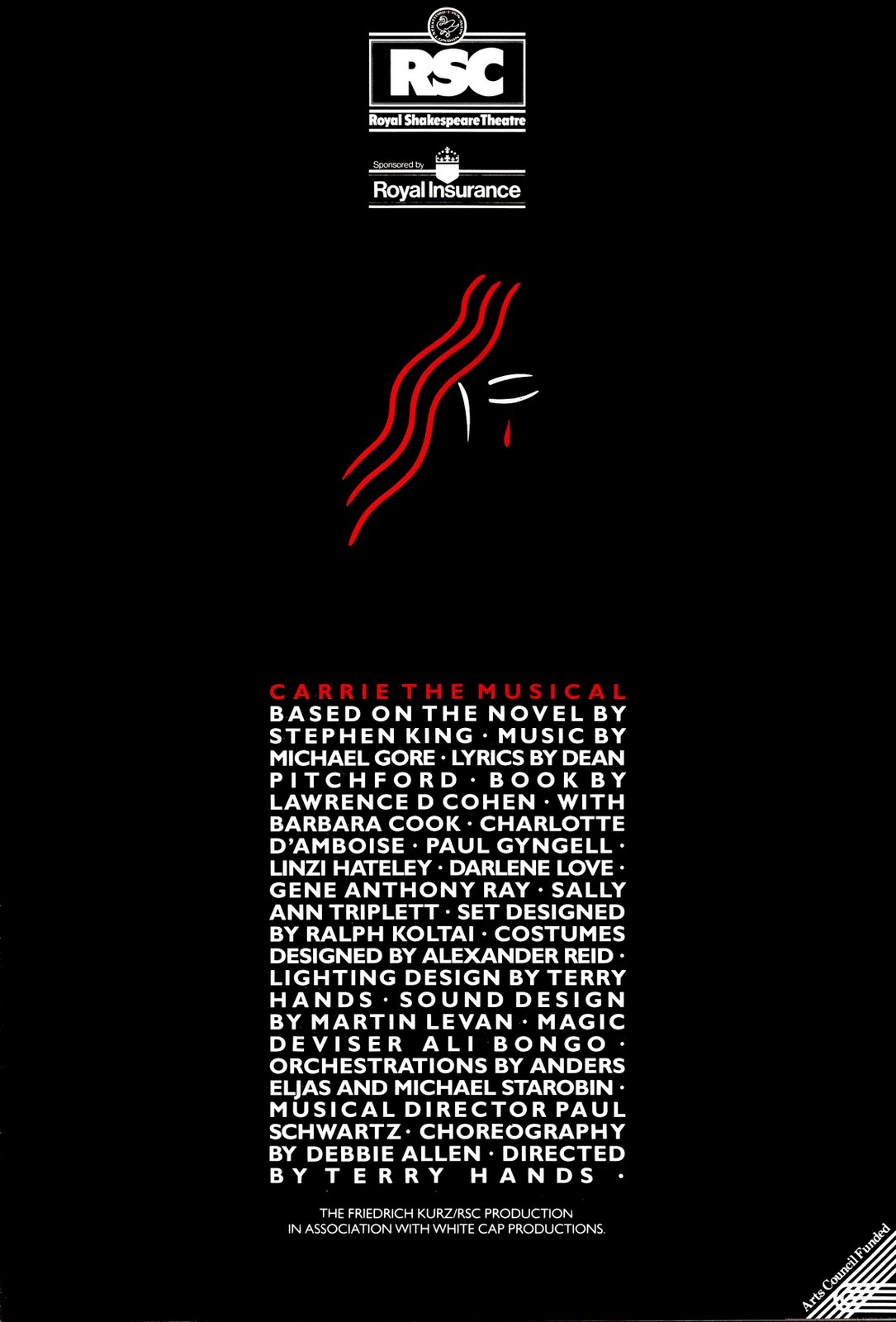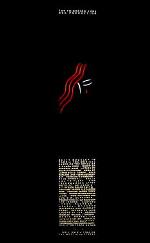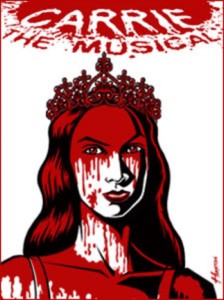

Version 1
Carrie (1988-02-Royal Shakespeare Theatre-Stratford)
Type de série: OriginalThéâtre: Royal Shakespeare Theatre (Stratford-Upon-Avon - Angleterre) Durée : 3 semaines Nombre : Première Preview : samedi 13 février 1988Première : samedi 13 février 1988Dernière : samedi 05 mars 1988Mise en scène : Terry Hands • Chorégraphie : Debbie Allen • Producteur : Commentaires longs: The production was plagued with script and technical problems. For starters, the crew were unable to douse Hateley with fake blood without causing her body microphone to malfunction. Rewrites continued following each show[4] and the program cited a song (Once I Loved a Boy) which was rewritten and renamed (When There's No One) prior to the first performance. Cook was nearly decapitated by an elaborate set piece on opening night, so she promptly resigned but agreed to stay on until a replacement could be cast, which was for the remainder of the Stratford run of the show. [3] A musical section of the Shower Room Scene (which has come to be known as Her Mother Should Have Told Her) was removed after the initial few performances, and another song called White Star was later excised.Presse : TIME OUT LONDON - by Jane Edwardes - 2/24/1988 : "It always did seem like a bad idea to turn Stephen King's chilling horror-story novel into a musical and events have sadly proved one right. This is the kind of show that will drive people out of the theatre and into the cinema for years to come. Where dePalma's film capiltalised on the medium's resources to create an apocalyptic finale for the revenge of the psychic Carrie on her high school tormentors; this musical, with its banal lyrics and disco score, cops out on the horror, and presents a line-up of precocious chorus girls calculated to appeal to the tired businessman rather than an honest portrait of the agonies of pre-pubescence. It was apparently all right for millons of film-goers to watch Carrie at the onset of her first period being pelted with sanitary towels and tampons, but not for the Broadway and Stratford theatre-goers who have to settle for an outbreak of teasing that wouldn't discomfort a blushing bride. As Carrie's mother, poor Barabra Cook has switches uneasily between half-hearted monster and over-protective mum. Even so, her voice and that of Linzi Hateley's as Carrie are almost the only redeeming features in the show. The structure switches mechanically from thier melodic hymnal duets to the pelvic thrusts of the high school as kind-hearted Sue (in pink) arranges for Carrie to go to the Prom while wicked Chris (in red) persuades her boyfriend (in a white codpiece) to organise her revenge. Ralph Kotai has produced a spectacular white set climaxing in a flight of steps the full length of the stage and it is typical of Terry Hands inept production that he can think of nothing to do with them. And the pig's blood that we are waiting for? No dramatic drop, just a pail plonked on the poor girls head. Shame on the RSC for housing such a tawdry event."
Adapté du roman Carrie de Stephen King, le musical se concentre sur une adolescente maladroite dotée de pouvoirs télékinétiques dont la vie solitaire est dominée par une mère enfermée dans un fanatisme religieux accablant. Quand elle est humiliée par ses condisciples au bal des étudiants du lycée, elle provoque les pires dégâts et s’acharne sur tout ce qui est dans son chemin.
Carrie est l'un des flops les plus connus du monde des musicals. On peut aller jusqu'à dire que c'est le premier qui vient à l'esprit.
Les raisons en sont multiples. En fait, tout ce qui pouvait être raté... l'a été. En Angleterre, le show va tenir moins d'un mois et à Broadway: 5 représentations (avec
Betty Buckely entre autres dans le cast)!!!
1 Carrie peut-être considéré comme un Flop musical
Inspired by a 1981 performance of Alban Berg's opera Lulu at the Metropolitan Opera House,[2] Lawrence D. Cohen, who wrote the script for the 1976 film version of Carrie, and Michael Gore began work on a musical based on the Stephen King novel. Gore's Fame collaborator, Dean Pitchford, was brought in to work on the project, which underwent numerous rewrites. In August 1984, a workshop of the first act was staged at 890 Broadway (New York City) with Annie Golden as Carrie, Maureen McGovern as Mrs. White, Laurie Beechman as Mrs. Gardener, and Liz Callaway as Chris. It was soon announced that Carrie would be produced on Broadway in 1986. Funding was not raised until late 1987.
Stratford Try-out)
The show was produced by Friedrich Kurz and the Royal Shakespeare Company and had its first four-week run beginning on February 13, 1988 in Stratford-upon-Avon, England, where it received mixed reviews. Directed by Terry Hands and choreographed by Debbie Allen, the cast included Broadway veteran and cabaret singer Barbara Cook, Charlotte d'Amboise, Gene Anthony Ray, Darlene Love, and Linzi Hateley, in her stage debut, as Carrie.
The production was plagued with script and technical problems. For starters, the crew were unable to douse Hateley with fake blood without causing her microphone to malfunction. Rewrites continued following each show, and the program cited a song ("Once I Loved a Boy which was rewritten and renamed ("When There's No One") prior to the first performance. Cook was nearly decapitated by an elaborate set piece on opening night, so she promptly resigned but agreed to stay on until a replacement could be cast, which was for the remainder of the Stratford run of the show. A musical section of the Shower Room Scene (which has come to be known as Her Mother Should Have Told Her) was removed after the initial few performances, and another song, "White Star", was later excised.
1988 Broadway Production
The show transferred to Broadway at an expense of $8 million (at the time an exorbitant amount). Hateley (who ultimately won a Theatre World Award) and other members of the UK cast remained with the show, but Cook was replaced by Betty Buckley (who had played the teacher Miss Collins in the 1976 film version).
The show started previews on April 28, 1988 at the Virginia Theatre. After the final song, boos were heard mixed in with applause. Ken Mandelbaum is quoted by Wollman, MacDermot, and Trask: "Ken Mandelbaum writes of an audience divided during early previews, the curtain calls of which were greeted with a raucous mix of cheers and boos. However, in an instant, when Linzi Hateley and Betty Buckley rose to take their bows, the entire theatre turned to a standing ovation. According to the New York Times, "The show had received standing ovations at some previews, as well as on opening night…" The show officially opened on May 12, 1988. Hampered by scathing reviews, and despite the fact that the theatre was sold out every night, the financial backers pulled their money out of the show, and it closed on May 15, 1988 after only 16 previews and 5 performances, guaranteeing its place in theatre history as one of the most expensive disasters of all time. According to The New York Times, the "more-than-$7 million show…was the most expensive quick flop in Broadway history."
Subsequent productions
In 1999, the Stagedoor Manor theater camp in upstate New York staged their own version of Carrie. With amateur performing rights never having been released for the show, this was an illegal, unlicensed production. Much to the surprise of all involved, Michael Gore and Larry Cohen were in the audience at one of the performances. An additional two unauthorized performances were later staged at Emerson College. When the play was staged at a high school in Denmark in 2001, the only soundtrack that was recorded specifically for disc was made, though the songs are in Danish. In 2008 Lochaber High School in Fort William, Scotland performed an unauthorized adaptation of Carrie. The school changed the script slightly in order to make the show "flow" better. They performed the Broadway version along with a full orchestra accompaniment. Prior to the opening night of Carrie, Lochaber High School invited all the British actors from the original Carrie musical to visit the school, watch the show and meet the cast. Linzi Hateley and several members of the original chorus came to watch the show.
The Broadway show was instantly legendary and soon inspired the title of Ken Mandelbaum's 1991 book Not Since Carrie: Forty Years of Broadway Musical Flops.
Although there is no official cast recording of the show, several bootleg audio tapes were surreptitiously made during live performances in both Stratford and New York, along with video footage shot from the audience, in addition to the professionally-made review tape sent to various journalists to promote the show. These recordings began to circulate soon after the show closed, and it was rumored in the early '90s that there were plans to record an official cast album, though it never happened. Buckley recorded the song "When There's No One" for her 1993 album Children Will Listen (the song also appeared on her 1999 album Betty Buckley's Broadway), and Hateley released the title song on her album Sooner Or Later. In 1999, "Unsuspecting Hearts" was recorded by Emily Skinner and Alice Ripley and released on their album of the same name.
Early in the 21st century, playwright Erik Jackson attempted to secure the rights to stage another production of the musical, but his request was denied. Jackson eventually earned the consent of Stephen King to mount a new, officially-sanctioned, non-musical production of Carrie, which debuted Off-Broadway in 2006 with female impersonator Sherry Vine in the lead role.
Rarely Done Musicals, a theatre that is dedicated to performing musicals that no one else will, have announced they plan to perform a concert version of Carrie: The Musical. Similarly, other unofficial spoofs have been staged over the years, most notably Scarrie! The Musical, Carrie White the Musical and Carrie's Facts of Life, which was a hybrid of Carrie and the American sitcom The Facts of Life.

Version 1
Carrie (1988-02-Royal Shakespeare Theatre-Stratford)
Type de série: OriginalThéâtre: Royal Shakespeare Theatre (Stratford-Upon-Avon - Angleterre) Durée : 3 semaines Nombre : Première Preview : samedi 13 février 1988Première : samedi 13 février 1988Dernière : samedi 05 mars 1988Mise en scène : Terry Hands • Chorégraphie : Debbie Allen • Producteur : Commentaires longs: The production was plagued with script and technical problems. For starters, the crew were unable to douse Hateley with fake blood without causing her body microphone to malfunction. Rewrites continued following each show[4] and the program cited a song (Once I Loved a Boy) which was rewritten and renamed (When There's No One) prior to the first performance. Cook was nearly decapitated by an elaborate set piece on opening night, so she promptly resigned but agreed to stay on until a replacement could be cast, which was for the remainder of the Stratford run of the show. [3] A musical section of the Shower Room Scene (which has come to be known as Her Mother Should Have Told Her) was removed after the initial few performances, and another song called White Star was later excised.Presse : TIME OUT LONDON - by Jane Edwardes - 2/24/1988 : "It always did seem like a bad idea to turn Stephen King's chilling horror-story novel into a musical and events have sadly proved one right. This is the kind of show that will drive people out of the theatre and into the cinema for years to come. Where dePalma's film capiltalised on the medium's resources to create an apocalyptic finale for the revenge of the psychic Carrie on her high school tormentors; this musical, with its banal lyrics and disco score, cops out on the horror, and presents a line-up of precocious chorus girls calculated to appeal to the tired businessman rather than an honest portrait of the agonies of pre-pubescence. It was apparently all right for millons of film-goers to watch Carrie at the onset of her first period being pelted with sanitary towels and tampons, but not for the Broadway and Stratford theatre-goers who have to settle for an outbreak of teasing that wouldn't discomfort a blushing bride. As Carrie's mother, poor Barabra Cook has switches uneasily between half-hearted monster and over-protective mum. Even so, her voice and that of Linzi Hateley's as Carrie are almost the only redeeming features in the show. The structure switches mechanically from thier melodic hymnal duets to the pelvic thrusts of the high school as kind-hearted Sue (in pink) arranges for Carrie to go to the Prom while wicked Chris (in red) persuades her boyfriend (in a white codpiece) to organise her revenge. Ralph Kotai has produced a spectacular white set climaxing in a flight of steps the full length of the stage and it is typical of Terry Hands inept production that he can think of nothing to do with them. And the pig's blood that we are waiting for? No dramatic drop, just a pail plonked on the poor girls head. Shame on the RSC for housing such a tawdry event."

Version 2
Carrie (1988-04-August Wilson Theatre-Broadway)
Type de série: Original BroadwayThéâtre: August Wilson Theatre (Broadway - Etats-Unis)
Durée : Nombre : 18 previews - 5 représentationsPremière Preview : jeudi 28 avril 1988Première : jeudi 12 mai 1988Dernière : dimanche 15 mai 1988Mise en scène : Terry Hands • Chorégraphie : Debbie Allen • Producteur : Avec : Margaret White … Betty Buckley
Carrie White … Linzi Hateley
Miss Gardner … Darlene Love
Sue … Sally Ann Triplett
Chris … Charlotte d'Amboise
Tommy … Paul Gyngell
Billy … Gene Anthony Ray
Jamie … Jamie Beth Chandler
Cath … Catherine Coffey
Michéle … Michele DuVerneyCommentaires longs: After the final song, boos were heard mixed in with applause. Ken Mandelbaum is quoted by Wollman, MacDermot, and Trask: "Ken Mandelbaum writes of an audience divided during early previews, the curtain calls of which were greeted with a raucous mix of cheers and boos. However, in an instant, when Linzi Hateley and Betty Buckley rose to take their bows, the entire theatre turned to a standing ovation. According to the New York Times "The show had received standing ovations at some previews, as well as on opening night..." The show officially opened on May 12, 1988. Hampered by scathing reviews, and despite the fact that the theatre was sold out every night, the financial backers pulled their money out of the show, and it closed on May 15, 1988 after only 16 previews and 5 performances, guaranteeing its place in theatre history as one of the most expensive disasters of all time. According to The New York Times, the "more -than-$7 million show...was the most expensive quick flop in Broadway history."

Version 3
Carrie (1999-07-Stagedoor Manor-New-York)
Type de série: Version non autoriséeThéâtre: Stagedoor Manor (Loch Sheldrake (NY) - Etats-Unis) Durée : Nombre : 2 représentationsPremière Preview : InconnuPremière : vendredi 30 juillet 1999Dernière : samedi 31 juillet 1999Mise en scène : ???? ???? • Chorégraphie : ???? ???? • Producteur : Commentaires longs: The Stagedoor Manor theater camp in upstate New York staged their own version of Carrie. With amateur performing rights never having been released for the show, this was an illegal, unlicensed production. Much to the surprise of all involved, Michael Gore and Larry Cohen were in the audience at one of the performances. While Gore castigated Stagedoor for producing the musical without permission, having enjoyed seeing the show with its re-worked ending and a cast of actual teenagers, he allowed the run to be completed.

Version 4
Carrie (200?-??-Emerson College-Boston)
Type de série: RevivalThéâtre: Emerson College (Boston - Etats-Unis) Durée : Nombre : Première Preview : InconnuPremière : InconnuDernière : InconnuMise en scène : ???? ???? • Chorégraphie : ???? ???? • Producteur : Commentaires longs: Une version amateur dans un collège américaon de Boston…Presse : A production of Emerson College in Boston, MA. The musical version of Carrie was one of Broadway's biggest flops. It cost $8 million to produce in 1988 (which at the time was an enormous amount of money), and it just ran for 5 performances. The show transferred from London, where it didn't do much better. It was such a dissapointment and embarresment for the shows writers, Lawrence D. Cohen, Dean Pitchford, and Michael Gore that they vowed they would not allow the show to be performed again. In 1999, the Stagedoor Manor theater camp in upstate New York staged their own version of Carrie. With amateur performing rights never having been released for the show, this was an illegal, unlicensed production. Much to the surprise of all involved, Michael Gore was in the audience at one of the performances. While he castigated Stagedoor for producing the musical without permission, having enjoyed seeing the show with its re-worked ending, he allowed the run to be completed (two performances). They ONLY exception they made for allowing the show to be performed was at Emerson College in Boston. To date, bootlegged videos of the London version, the Broadway version and the Stagedoor version have surfaced and have been circulating. The Emerson College version had never been found…until now!

Version 1
Carrie (2013-10-Moore Theatre-Seattle)(Revival)Durée : 2 semaines Nombre : Première Preview : vendredi 11 octobre 2013Première : vendredi 11 octobre 2013Dernière : samedi 26 octobre 2013Mise en scène : Chorégraphie : Avec : Alice Ripley (Margaret White), Keaton Whittaker (Carrie White), Kendra Kassebaum (Miss Gardner), Larissa Schmitz (Sue Snell), Kody Bringman (Tommy Ross), Tessa Archer (Chris Hargensen).
Pas encore de video disponible pour ce spectacle

.png)
.png)





 Génèse complète
Génèse complète